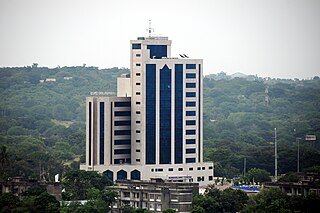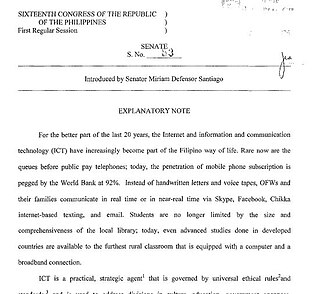
The National Telecommunications and Information Administration (NTIA) is a bureau of the United States Department of Commerce that serves as the president's principal adviser on telecommunications policies pertaining to the United States' economic and technological advancement and to regulation of the telecommunications industry.

Korea Education & Research Information Service is a governmental organization under the South Korean Ministry of Education, Science and Technology that develops, proposes, and advises on current and future government policies and initiatives regarding education in South Korea.

A national broadband plan is a national plan to deploy broadband Internet access. Broadband is a term normally considered to be synonymous with a high-speed connection to the internet. Suitability for certain applications, or technically a certain quality of service, is often assumed. For instance, low round trip delay would normally be assumed to be well under 150ms and suitable for Voice over IP, online gaming, financial trading especially arbitrage, virtual private networks and other latency-sensitive applications. This would rule out satellite Internet as inherently high-latency. In some applications, utility-grade reliability or security are often also assumed or defined as requirements. There is no single definition of broadband and official plans may refer to any or none of these criteria.
The Communications Authority of Kenya (CA) is the independent regulatory agency for the ICT industry in Kenya with responsibilities in telecommunications, e-commerce, broadcasting,cyber security, and postal/courier services. The CA is also responsible for managing the country's numbering and frequency spectrum resources, administering the Universal Service Fund (USF) as well as safeguarding the interests of users of ICT services.
All European countries show eGovernment initiatives, mainly related to the improvement of governance at the national level. Significant eGovernment activities also take place at the European Commission level as well. There is an extensive list of eGovernment Fact Sheets maintained by the European Commission.

The Tanzania Communications Regulatory Authority (TCRA), established under the TCRA Act No. 12 of 2003, is an independent body responsible for overseeing the postal, broadcasting, and electronic communications industries in the United Republic of Tanzania. It is headquartered in the Mikocheni ward of Kinondoni District in the Dar es Salaam Region. The TCRA was formed through the merger of the former Tanzania Communications Commission and the Tanzania Broadcasting Commission and is accountable to the Ministry of Communications and Technology.
The use of new media in Ghana like elsewhere is growing. The Information and Communications Technologies (ICT) sector, which is based on a free market approach, has promoted new media use. Most popular aspects of new media to Ghanaians is the Internet, and its associated mobile and desktop applications for education, health, politics, business, publishing, governance and so on. Also popular is the use of mobile devices like smartphones and tablets and computers.

Ghana Open Data Initiative (GODI) was started in January 2012 by the National Information Technology Agency (NITA) in partnership with the Web Foundation (WF), to make Government of Ghana data available to the public for re-use. The establishment of GODI is meant to promote efficiency, transparency and accountability in governance as well as to facilitate economic growth by means of the creation of Mobile and Web applications for the Ghanaian and world markets. The project was scheduled for completion in 2014 and aimed to create a sustainable Open Data ecosystem for Ghana. GODI was launched with a 100 data sets categorized as political, legal, organizational, technical, social or economic. The vision of GODI is to develop an open data community involving the Government of Ghana, civil society organizations, industry, developer communities, academia, media practitioners, and the citizenry, to interact with one another with the aim of developing an open data portal to bring about transparency, accountability and efficiency in government.

The Magna Carta for Philippine Internet Freedom is an internet law bill filed in the Congress of the Philippines. The bill contains provisions promoting civil and political rights and Constitutional guarantees for Philippine internet users, such as freedom of expression, as well as provisions on information and communications technology (ICT) policy, ICT4D, internet governance, e-governance, cybersecurity, cyberwarfare, cyberterrorism, and cybercrime.

The Ministry of Communication, Digital Technology and Innovation is a government ministry responsible for the development of communications and technology in Ghana. The ministry's offices are in Accra, Greater Accra.
The Bangladesh Computer Council (BCC) is a statutory government organization operating under the Information and Communication Technology Division of the Ministry of Posts, Telecommunications, and Information Technology of the government of Bangladesh. Its headquarters are situated in Agargaon, Dhaka, Bangladesh. It was initially known as the National Computer Committee (NCC) in 1983 and transformed into the Bangladesh Computer Council through Act No. 9 of the National Parliament in 1990.

The National Competitiveness Council (NCC) is a public-private body that develops strategy for the long-term competitiveness of the Philippines through policy reforms, project implementation, institution building, and performance monitoring.
The National Information and Technology Authority - Uganda (NITA-U) is an autonomous government parastatal under the Ministry of ICT and National Guidance in Uganda, mandated to coordinate, promote and monitor Information and Technology developments in Uganda within the context of National Social and Economic development.
The Ministry of Planning is the cabinet-level ministry of the Iraqi government responsible for promoting economic growth and human development through strategic planning. Among its tasks is to realize sustainable development, social justice, poverty-alleviation as well as the reduction of unemployment, enhancement of institutional capacities, and development of standardisation.
Ghana has one of the highest rates of cybercrime in the world, ranking 7th in a 2008 Internet Crime Survey. The most popular form of cybercrime in Ghana is cyberfraud and is typically achieved via credit card fraud. However, recent decreases in universal credit card usage has seen the expansion of other cybercrimes such as blackmail and hacking. This growth in crime has warranted a government response, with policies specifically addressing the cyberspace being developed. This has necessitated various studies including a cyber security maturity study which was inaugurated by the Ministry of Communications and conducted by the Global Cyber Security Capacity Center (GCSCC) of the University of Oxford in collaboration with the World Bank.

The Ghana Education Service (GES) is a government agency under the Ministry of Education responsible for implementing government policies that ensure that Ghanaians of school-going age irrespective of their ethnicity, gender, disability, religious and political dispositions receive quality formal education. The Ghana Education Service is governed by a fifteen-member council called the GES council.
The Ghana Investment Fund for Electronic Communications (GIFEC) was established as an implementing agency of the Ministry of Communications, in January 2004, with the formulation of the comprehensive ICT for Accelerated Development (ICT4AD) Policy, which seeks to engineer an ICT-led socio-economic development process with the potential to transform Ghana into a middle income, information-rich, knowledge-based and technology driven economy and society The legislation that strengthened the agency was promulgated in 2008 as the Electronic Communications Act 775, aimed at providing for electronic communications, broadcasting, and the use of the electro-magnetic spectrum and related facilities in Ghana. The promulgation of the Electronic Communications Act, 2008 gave legal backing to the organisation, thereby changing its name to Ghana Investment Fund for Electronic Communications (GIFEC), as well as giving it an expanded mandate and scope. It is the Government of Ghana agency established to facilitate the implementation of universal access to electronic communication and the provision of internet to under-served and un-served communities, facilitate capacity building programmes and promote ICT.

The House Committee on Communications is a standing committee of the Nigerian National Assembly tasked with legislative oversight of the communications sector, including telecommunications, information technology, and digital economy policies.

The Universal Service Provision Fund otherwise known as USPF or Provision Fund is a Federal Government of Nigeria initiative established to facilitate the achievement of national policy goals for universal access and universal service to information and communication technologies (ICTs) in rural, un-served and under-served areas in Nigeria. The Fund is being managed to facilitate the broadest possible access to affordable telecommunications services for more significant social equity and inclusion for the people of Nigeria.
The Bureau of Public Service Reforms (BPSR) is a federal agency in Nigeria, established on February 4, 2004, to enhance public service efficiency, transparency, and governance through coordinated reforms across ministries and agencies.












